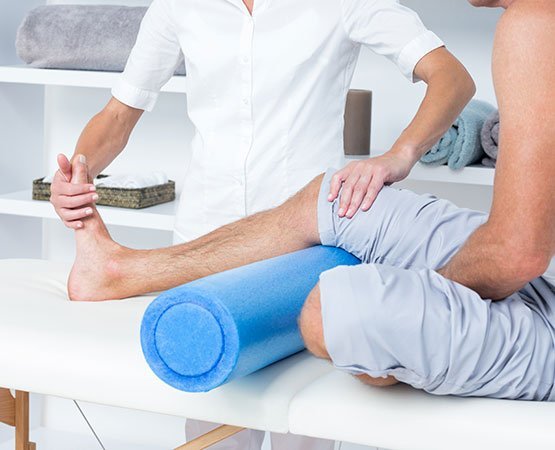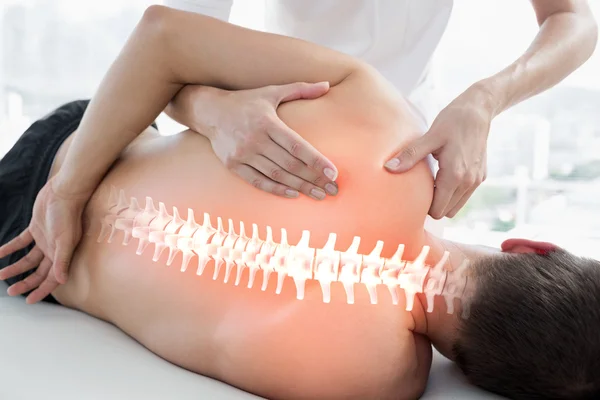
What is Physiotherapy?
Physiotherapy is a healthcare profession that assists people to restore, maintain and maximize their strength, function, movement and overall well-being.
Physiotherapists have specialized knowledge of how the body works and experienced hands-on clinical skills to assess, diagnose and treat symptoms of illness, injury and disability. Physiotherapy includes rehab as well as the prevention of injury and the promotion of health and fitness.
In British Columbia, you can see a physiotherapist without a doctor’s referral.
Physiotherapy can help you resume the activities that are important to you. This includes:
- Becoming stronger and more flexible;
- Increasing freedom of movement and mobility;
- Breathing more easily;
- Reducing pain;
- Staying active;
- Preventing injury.
The Patient Experience


What Conditions Can Physiotherapy Treat?
Physiotherapy is multi-dimensional and can treat a vast variety of conditions. It focuses primarily on the restoration and rehabilitation of the circulatory and musculoskeletal systems but can also be used to treat a diversity of conditions from sports injuries, arthritis and respiratory problems.
Muscular aches
Physiotherapy can ease stiffness, reduce pain and encourage blood flow to the muscles. Massage therapy can also be used to reduce tension around aching muscles.
Aches and pains are common following a frantic and physically demanding period of exertion. Often sports players have physiotherapy to ease aches as well as increase flexibility and ease stiffness. If an injury has occurred physiotherapy can facilitate the healing and rehabilitation process.
These may arise when there is an impact to the head or inner ear. This can happen during motor vehicle accidents, from sports-related injuries, or other traumas to the head. When this happens, false information is sent to the brain about the head’s movement and position. This causes that dizzy, disoriented feeling. It can also cause havoc with one’s balance as well as nausea since the vestibular system has been disrupted and the brain cannot make sense of the sudden changes in gravity and head positioning. Other causes of vestibular disorder are migraines, inner ear infections, diabetes, low vitamin B12 levels, medication, dehydration and osteoporosis.
Arthritis
As people get older they are more likely to develop arthritis which affects the joints and can reduce mobility. Physiotherapy helps to ease stiffness in the joints and to increase blood flow to the muscles and enhance the range of physical movement. Physiotherapy can also help to build strength. The exercises are often gentler for older people who are usually more fragile.
Respiratory problems
Cystic fibrosis, which is a condition that primarily affects the lungs and digestive system can be helped by physiotherapy. Often physiotherapists can perform exercises which help to clear the chest and ease breathing. Physiotherapy can also ease and control pain and improve posture which will usually make it easier to breathe. Patients suffering from other conditions including pneumonia, asthma and lung cancer may also benefit from physiotherapy.
Women's Health and Pelvic Floor Rehabilitation
Women's bodies are unique and are subject to a variety of physiological changes throughout their lives, including pregnancy, childbirth, menopause, and aging. These changes can often result in pain, discomfort, and loss of function, making physiotherapy an important part of maintaining overall health and wellness.
There are a number of areas that physiotherapy concentrated on Women's Health can help with. These include urinary incontinence, pelvic pain, pain during sexual activity, postpartum recovery, osteoporosis amongst others.
Incontinence (Bowel and Bladder)
Incontinence is a common condition that affects people of all ages, but it is particularly prevalent among older adults. Incontinence is a loss of bladder or bowel control that can cause embarrassment and discomfort, and can greatly impact a person's quality of life. Physiotherapy can be an effective treatment for various kinds of urinary incontinence and fecal incontinence inlcuding stress incontinence, urge incontinence and mixed incontinence, helping to alleviate symptoms and improve overall bladder and bowel control.
Physiotherapy can help to alleviate the symptoms of incontinence by strengthening the pelvic floor muscles, which support the bladder and urethra.
Our Speciality Programs
If you think about it, most of us spend at least 1/3 of our day at work. For those of us who are involved with manual labour, lifting incorrectly, walking with the wrong shoes or insoles can also lead to chronic pain and long term damage to our bodies. Common conditions related to poor sitting posture can include carpal tunnel syndrome (CPT), forward head posture (FHP), posterior pelvic tilt, kyphosis and stress on the ulnar nerve amongst others.
A car accident can wreak havoc on the body and cause minor aches as well as more serious injuries. From whiplash to tightness and impacts to your range of motion, physiotherapists can help with injuries of all types as well as with pain management. In cases where an individual has experienced a serious accident, it may be necessary to learn how to walk, sit up and turn over again which will require a long period of intensive physiotherapy; this rehabilitation may include all aspects of treatment in order to facilitate the healing process and control pain.
Post-Operative Rehabilitation Physiotherapy, sometimes called Post-Surgical Physiotherapy, is a treatment plan for patients who are undergoing surgery or have just had surgery. Our physiotherapists can help with your recovery and assist you in returning to your daily activities faster. Some of the more common surgeries we help patients with include: ACL reconstruction, total knee replacements, patella reconstruction, shoulder surgery, spinal surgery, hip replacement and hip arthroscopy, wrist fracture, carpal tunnel release and ankle fractures and reconstruction.
Our physiotherapists can also assess whether you need a brace and can arrange a fitting for you if your condition would benefit from it. Most of our medical braces are covered by extended health plans.


